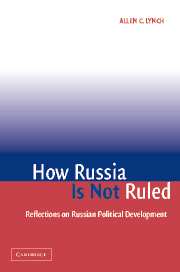Book contents
- Frontmatter
- Contents
- Acknowledgments
- Introduction
- 1 Historical Patterns of Russian Political Development
- 2 Soviet Legacies for Post-Soviet Russia
- 3 The 1990‘s in Russia: A New Time of Troubles?
- 4 Russia's “Neopatrimonial” Political System, 1992–2004
- 5 The Russian 1990s in Comparative Perspective
- 6 What Future for Russia? Liberal Economics and Illiberal Geography
- Conclusions
- Select Bibliography
- Index
3 - The 1990‘s in Russia: A New Time of Troubles?
Published online by Cambridge University Press: 14 January 2010
- Frontmatter
- Contents
- Acknowledgments
- Introduction
- 1 Historical Patterns of Russian Political Development
- 2 Soviet Legacies for Post-Soviet Russia
- 3 The 1990‘s in Russia: A New Time of Troubles?
- 4 Russia's “Neopatrimonial” Political System, 1992–2004
- 5 The Russian 1990s in Comparative Perspective
- 6 What Future for Russia? Liberal Economics and Illiberal Geography
- Conclusions
- Select Bibliography
- Index
Summary
Numerous bribe takers are also usually seen as corrupt. [This is wrong because] only those who have links with the organized criminal gangs can be regarded as corrupt officials. Do not mistake bribe-taking for corruption.
– Russian Minister of the Interior Vladimir RushayloIntroduction
In the previous chapter, we established that the USSR itself represented a patrimonial society, albeit one that was both more comprehensive and intensive than Tsarist Russia ever was. The distinctive fusion of communist political monopoly and Soviet state monopoly ownership of capital, in the context of a generally hostile international environment, cemented the Soviet party-state system that was to last for the better part of the twentieth century. Given the virtual asphyxiation of organized public life outside the framework of the communist party-state system, down to the apparently most innocuous levels (such as fishing clubs), the sudden collapse of that system could be expected to have the most dramatic consequences for the integrity of the economy and the society, not to mention the country's international standing. The disintegration of the USSR in 1991 thus represented the end of a fixture in Russian life, with only brief interruptions (1917–20 and the early 1600s), since the emergence of Muscovy in the course of the fifteenth and sixteenth centuries: the presence of a powerful, highly centralized, militarized, and largely unaccountable patrimonial state. Interestingly, that state disintegrated (1989–91) precisely as the international political system was becoming the least threatening in the millennium of Russian statehood.
- Type
- Chapter
- Information
- How Russia Is Not RuledReflections on Russian Political Development, pp. 85 - 127Publisher: Cambridge University PressPrint publication year: 2005

